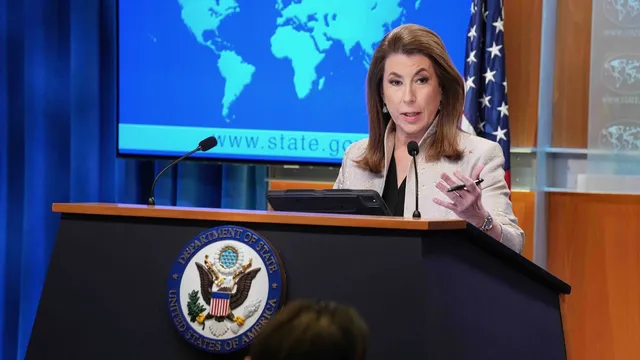
American citizen killed in devastating Russian missile strike in Kyiv
2025-06-18 00:52- A recent Russian bombardment resulted in significant casualties in Kyiv, including 15 fatalities.
- The U.S. State Department has confirmed the death of an American citizen among the victims.
- The incident illustrates the urgent need for increased global support for Ukraine in the face of ongoing aggression.
Express your sentiment!
Insights
On June 17, 2025, a devastating attack occurred in Ukraine's capital, Kyiv, involving a barrage of Russian missile strikes and drone assaults. The assault marked the deadliest attack of the year on Kyiv, resulting in 15 fatalities and over 156 injuries. Among the deceased was an American citizen, as confirmed by the U.S. State Department. The attack was characterized by the use of over 440 drones and 32 missiles, leading to significant destruction, particularly affecting residential buildings. Ukrainian President Volodymyr Zelenskyy reported that other Ukrainian regions were also targeted during the extensive bombardment. In the aftermath of this violence, the U.S. government condemned the strikes and expressed condolences to the victims' families. The State Department highlighted the commitment to the safety of Americans abroad, while also criticizing strikes targeting civilian areas. The incident underscored global concerns regarding the ongoing conflict between Russia and Ukraine, prompting international dialogues about support and sanctions against Russia. Meanwhile, an intense diplomatic visit took place, with more than 60 foreign diplomats visiting the site of the missile strike to assess the damage and pressure the international community to increase support for Ukraine. The Ukrainian Ministry of Foreign Affairs organized this visit to demonstrate the consequences of Russian aggression. The Ukrainian officials emphasized the need for heightened sanctions pressure on Russia and called for greater international military support to strengthen Ukraine's defense capabilities. This incident highlights the grim reality of civilian vulnerabilities in wartime and the urgent need for international solidarity against acts of aggression. As the conflict drags on, issues arise regarding the past diplomatic relations with Russia. Some leaders, including former U.S. President Donald Trump, have critiqued decisions made in past diplomatic efforts, specifically referencing Russia's exclusion from the G8 in 2014, suggesting that those actions have contributed to the current conflicts. Furthermore, negotiations and discussions regarding sanctions against Russia are in progress as U.S. officials examine their options. This ongoing situation has led to various international responses aimed at addressing the Russian military actions that continue to threaten Ukrainian sovereignty and civilian safety. The tragic loss of lives from these attacks serves as a stark reminder of the human cost of this prolonged conflict.
Contexts
The international diplomatic reactions to the Ukraine conflict have been multifaceted and dynamic since the onset of hostilities in 2014, with significant escalation in 2022. Nations and international organizations have responded through a range of actions including economic sanctions, military support, diplomatic negotiations, and humanitarian assistance. These responses have been shaped by various factors including national interests, historical ties, geopolitical considerations, and international law. The conflict has not only influenced bilateral relationships but also reshaped alliances and global power dynamics, prompting discussions about security and defense in Europe and beyond. Western nations, particularly the United States and European Union members, have largely condemned Russia's actions and have taken a unified stance in imposing sanctions targeting key sectors of the Russian economy, including finance, energy, and defense. Military support for Ukraine has also been a critical aspect of Western diplomacy, with countries providing various forms of military aid ranging from weapon systems to training programs for Ukrainian forces. Eastern European nations, many of whom have historical concerns regarding Russian aggression, have been particularly vocal in their support for Ukraine and in their calls for a robust response from NATO and the international community. Conversely, countries like China and India have adopted a more neutral or conciliatory stance, emphasizing dialogue and negotiation over sanctions or military involvement. China, in particular, has sought to balance its strategic partnership with Russia while maintaining a positive relationship with Western powers. India has reiterated its commitment to a peaceful resolution and has focused on humanitarian support, reflecting its non-aligned position historically. This diversified approach among states highlights the complexities of international relations and the varying degrees of commitment to addressing the conflict. International organizations, including the United Nations, have played a crucial role in mediating discussions and providing platforms for dialogue. However, the effectiveness of these efforts has been hampered by the geopolitical rivalries among member states. Humanitarian agencies have also been active, addressing the needs of displaced populations and those affected by the conflict. As the situation evolves, the international community continues to grapple with the challenges of navigating the conflict, balancing national interests with the imperative of upholding international norms and protecting human rights.